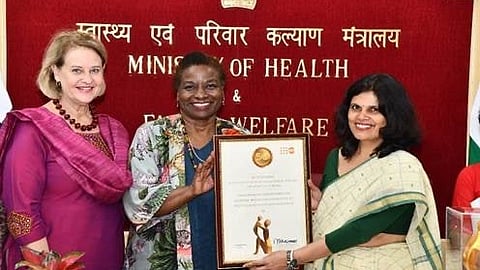

India’s strides in improving maternal health and advancing family planning have been recognized by the United Nations Population Fund (UNFPA). In a recent event, Dr. Natalia Kanem, Executive Director of UNFPA, presented a plaque and certificate to Smt. Punya Salila Srivastava, Union Health Secretary of India, highlighting the country’s substantial progress in these critical areas of public health. This accolade underscores UNFPA’s long-standing collaboration with India, as both entities continue to work together to promote the health and well-being of women and girls.
The Ministry of Health and Family Welfare, led by Smt. Srivastava, has implemented several initiatives aimed at improving maternal health outcomes, with the ultimate goal of achieving zero preventable maternal deaths. Some of the key initiatives include the Surakshit Matritva Aashwasan Yojana (SUMAN), the Pradhan Mantri Surakshit Matritva Abhiyan (PMSMA), and the Midwifery Services Initiative. These programs are designed to ensure high-quality, respectful maternity care for women across India.
Also present at the ceremony were Smt. Aradhana Patnaik, Additional Secretary and Mission Director of the National Health Mission, Smt. Meera Srivastava, Joint Secretary of Reproductive and Child Health (RCH), and Mr. Pio Smith, UNFPA’s Asia-Pacific Regional Director. Ms. Andrea M. Wojnar, UNFPA’s India Representative, was also in attendance. During her remarks, Dr. Kanem praised India’s impressive reduction of the Maternal Mortality Ratio (MMR) by 70% between 2000 and 2020, a feat that places the country on track to achieve the Sustainable Development Goal (SDG) target of an MMR below 70 by 2030.
This remarkable achievement, which has saved the lives of thousands of women, especially from marginalized communities, is a testament to the country’s commitment to improving maternal health. India’s progress in family planning has been equally commendable. The Total Fertility Rate (TFR) has been reduced to below replacement level (TFR-2), marking a significant achievement in the nation’s population stabilization efforts.
UNFPA has been a key partner in supporting India’s family planning initiatives, helping to expand contraceptive options for women. This includes the recent introduction of Subdermal Implants and injectable Depot Medroxyprogesterone Acetate (DMPA), which have contributed to the country’s success in reducing fertility rates.
India’s leadership on the global stage in reproductive health has also been widely recognized. The country holds influential positions in international partnerships such as the Partnership for Maternal, Newborn & Child Health (PMNCH) and the Family Planning 2030 (FP2030) global initiative.
Dr. Kanem reiterated UNFPA’s unwavering commitment to supporting India in its mission to advance the health and well-being of women, girls, and young people. This event, held as UNFPA celebrates 50 years of partnership with the Indian government, marked a significant milestone in their shared pursuit of ensuring better health outcomes for all women in India. The event also reflects the nation’s broader vision of ‘Viksit Bharat’ (Developed India).
Other dignitaries attending the event included Dr. Indu Grewal, Additional Commissioner of Family Planning, Dr. Pawan Kumar, Additional Commissioner of Maternal Health and Immunization, and Dr. Zoya Ali Rizvi, Deputy Commissioner of Nutrition and Adolescent Health, along with senior officials from the Ministry and UNFPA delegates.
India’s efforts to enhance maternal health and family planning have garnered international recognition, reaffirming the country’s role as a leader in advancing reproductive health globally.
(Input from various sources)
(Rehash/Ankur Deka/MSM)
